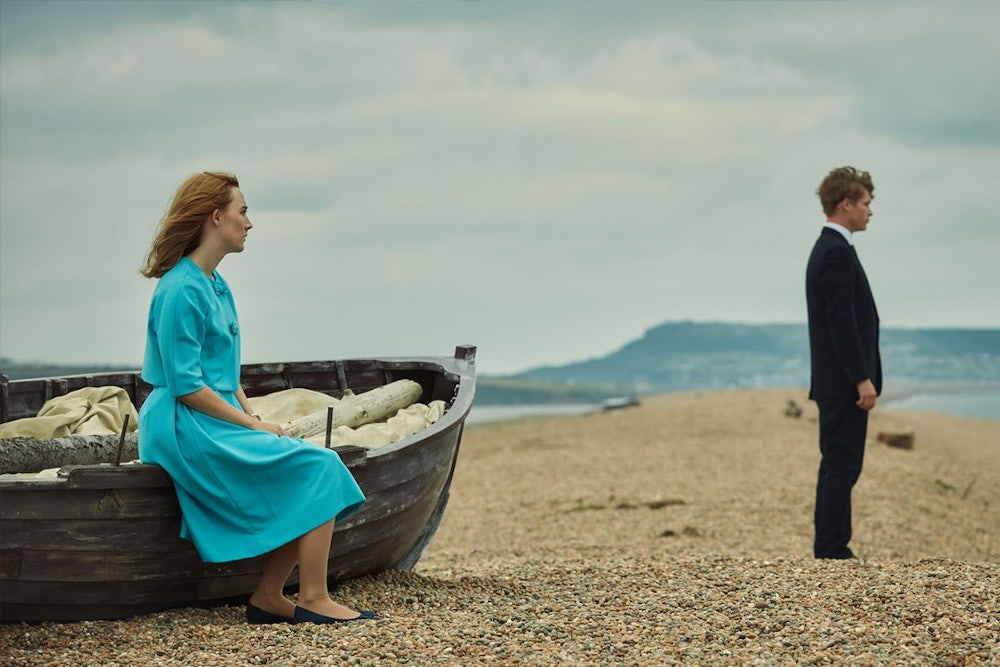If you asked me to choose the least adaptable novel of all time, I would pick Ian McEwan’s On Chesil Beach. I bought it when it was first published in 2007, eager to while away a few hours with the reliable author of Saturday (2005), Enduring Love (1997), and Amsterdam (1998). But as I sat on a local hilltop turning the book’s final pages, all the blood drained from my body and ran, it seemed, into the grass below.
On Chesil Beach is the single most embarrassing thing I have ever read. This is not to say that the book is bad: It’s a slim work of fiction (a novella, really) that focuses on a single relationship, between Edward and Florence. The “real-time” narrative covers a single evening in 1962 in which the couple, who have just married, bumble inexorably toward their first sexual encounter. In his characteristic style, McEwan goes backwards and forwards through time, rummages through each character’s thoughts, and outlines the social forces that unite and separate them both. But the book’s anticlimax is the hook upon which the whole thing hangs. And it is excruciating.
As a device, it’s McEwanish enough. In the build-up to that moment, we learn all sorts of interesting things about bad communication, arctic British sexuality, and the ways that people fall in and out of love. But even thinking about the fumble that ends this couple’s relationship makes me turn pale with second-hand humiliation. Why, why would you adapt such a book into a film?
It turns out that the decisive moment is underplayed in the movie. Saoirse Ronan is Florence, and Billy Howle plays Edward. They’re both great actors, and they’re backed up by some truly outstanding ones: Anne-Marie Duff plays Edward’s brain-damaged mother, whose narrative function is to work up a discourse around Uccello’s Hunt in the Forest, a painting of perfect technical execution and also roiling, deep darkness. Emily Watson plays Florence’s healthy-brained but cruel mother. (In one of the movie’s best moments, she delivers the word “mangetout” at the dinner table like an executioner.) The film’s director Dominic Cooke had an able cast at his disposal, and made one great decision: He tilted the movie towards a focus on time and identity, playing up every theme except the sexual one.
The movie opens and closes with wide shots of the eponymous beach. The couple walks down its edge, Florence in a blue dress. As they sit down to a dinner of awful British food (melon with a glacé cherry, nuclear beef, bad wine), a bottle spills. This, uh, premature pouring does presage certain later plot points, but it also symbolizes something more complicated, a kind of dreadful irreversibility. You can’t put the toothpaste back in the tube, you can’t unring a bell, and you can’t go home from the honeymoon until you’ve had sex. The couple are prisoners in the very thing they thought they wanted the most.
For brief moments the characters escape into the past, often via objects. A piano key, a hand, a morsel of food—the camera will zero in on these memory triggers, then the world around them will transform. Florence is a violinist who dreams of making it big, and in one scene we see her press a piano key at Wigmore Hall in London. But then the song turns into a wireless version, and the movie pivots, inescapably, back to the “now” of the honeymoon hotel.
Music is crucial for understanding the otherwise quiet Florence. We see her past self explaining a piece of Mozart to the other musicians. Every phrase is a question, she explains. Every scene is like a question in On Chesil Beach, a question that the almost-happy couple ask of each other in their own indecipherable language, never receiving an answer.
Edward, by contrast, likes rock’n’roll. Florence can only come up with the words “merry and bouncy” to describe the song he plays for her, which is sweet but all wrong. The theme of music thus becomes a theme of disharmony, literally and figuratively. Florence is a careful and controlled person who finds profound expression through Mozart. Edward finds his raucous desires reflected in rock, desires that take outward expression in sweaty dancing.
There is one configuration, or bit of choreography, that repeats again and again in the movie. Edward and Florence will face in the same direction, one behind the other. It’s like the Magritte painting of Edward James, where we see the back of his head as he stares into a mirror, which shows, instead of his face, the back of his head again. In one scene, Edward and Florence stand this way before a gramophone, before he seizes her and they dance. Later, on the beach, they stand in this configuration for a last time. Instead of dancing, Edward rages alone, and Florence walks away.
When the undressing finally comes, we hear them kissing. It is so close that it is as if we can feel the static of their clothing. Florence’s underwear is the same color as her blue dress. It was designed to be seen, but now she hides it. To delve further into this hideous moment would be unfair on the unwitting viewer, but I can promise that it’s nowhere near as bad as the experience of reading the book. That is not to say that watching the movie is comfortable, because it isn’t. But with such confident performers and such a strong interest in their characters’ personalities, Dominic Cooke has made surprisingly good work of On Chesil Beach. You couldn’t pay me to sit through it again, but that’s Ian McEwan’s fault.
